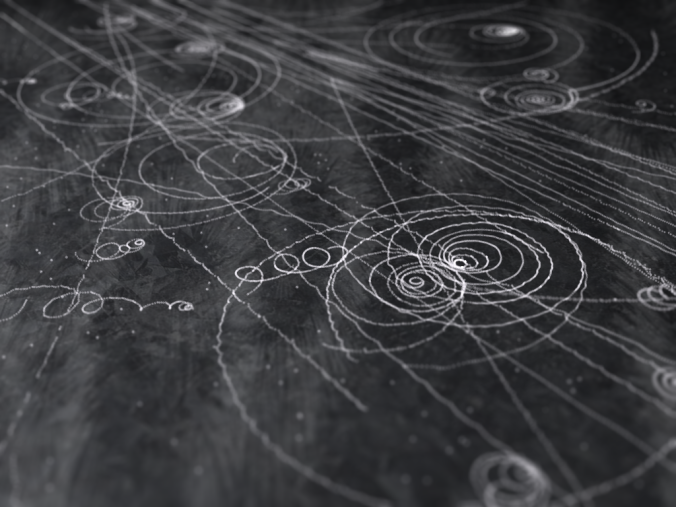by Elizabeth
By now you probably know I’m a romantic about the Cosmos. So when I heard that Krista Tippett had interviewed Margaret Wertheim for her podcast On Being on April 23rd of this year, I knew right away I had to listen to it. Several years ago Wertheim gave a TED talk on coral reefs as physical representations of hyperbolic (or non-Euclidean) geometry, and I’ve been enraptured by — nay almost addicted to — those ideas ever since. (But hyperbolic coral geometry is a blog post for another day.)
Anyway, at one point during the interview Krista Tippett says, “So, I always like this fact that light can be a particle or a wave depending on what question you ask of it as kind of a way of demonstrating, I think — something we all also experience, that contradictory explanations of reality can simultaneously be true.” Oh yes – there is paradox in physics as well as life. I’ve talked about that before.
Krista goes on to read something beautiful that Margaret Wertheim wrote in one of her books:
“Wave particle duality is a core feature of our world. Or rather, we should say, it is a core feature of our mathematical descriptions of our world. But what is critical to note here is that, however ambiguous our images, the universe itself remains whole and is manifestly not fracturing into schizophrenic shards. It is this tantalizing wholeness and the thing itself that drives physicists onward like an eternally beckoning light that seems so teasingly near. It is always out of reach.”
In the interview Margaret expounds on her own quote:
“Physics, for the past century, had this dualistic way of describing the world. One in terms of waves, which is usually conceived of as a continuous phenomena. And one in terms of particles, which is usually conceived of as a discrete or sort of digitized phenomena. And so quantum mechanics gives us the particle, as it were, discrete description. And general relativity gives us the wavelike, continuous description. And general relativity operates at the cosmological scale. And quantum mechanics operates so brilliantly at the subatomic scale. And these two theories don’t currently mathematically mesh. So the great hope of physics for the last 80 or so years has been, ‘Can we find a unifying framework that will combine general relativity and quantum mechanics into one mathematical synthesis?’ And some people believe that that’s what string theory can be. And it’s often — when contemporary physicists write about the world, they talk about this as being a fundamental problem for reality. But it’s not a fundamental problem for reality. It’s a fundamental problem for human beings. The universe is just getting on with it.
And so I think the universe isn’t schizophrenic. It’s not having a problem. We’re having a problem. And I don’t think it means that there’s anything wrong with what physicists are doing. Quantum mechanics and general relativity have both been demonstrated to be true in their demands of expertise to 20 decimal places of experimentation. That’s a degree of success which is mind-blowing and awe-inspiring. But the fact that these two great, fabulously functional descriptions don’t fit together means we haven’t, by any means, learned all we’ve got to know about the world.”
I love how Wertheim says the Cosmos isn’t fracturing with our inability to reconcile relativity (on the large scale of planets, stars, and galaxies) with quantum mechanics (on the small scale of subatomic particles). The Universe isn’t freaking out about this problem. We humans are the ones freaking out, because we can’t get the math to work.
In the same way, our faith need not manifestly fracture into shards with our inability to fit together paradoxical descriptions of God – nor, for that matter, does God Himself fracture with our human inability to understand all of Him. I love the idea that the Cosmos and its Creator are higher than our capacity to comprehend them. I love the sense of awe and wonder that induces. And I love the fact that there’s always more for us to learn and discover.
In the 6th chapter of John’s gospel, Jesus says some really strange cannibalistic-sounding things. The disciples respond by saying, “This is a hard teaching. Who can accept it?” The Greek word that is translated “accept” means to “comprehend by listening.” I find there is a difference between accepting something as paradox or mystery, and actually comprehending it. So perhaps the disciples were really saying, “Who can understand this teaching?”
I do not need to fully understand the way the universe works in order to accept that it does work. I do not have to fully understand Jesus’ words in order to accept them as Truth. This is the enigma of loving a limitless God. This is the mystery of life with Christ, God-made-flesh. This is the joy of a faith that won’t fracture.
photo credit



